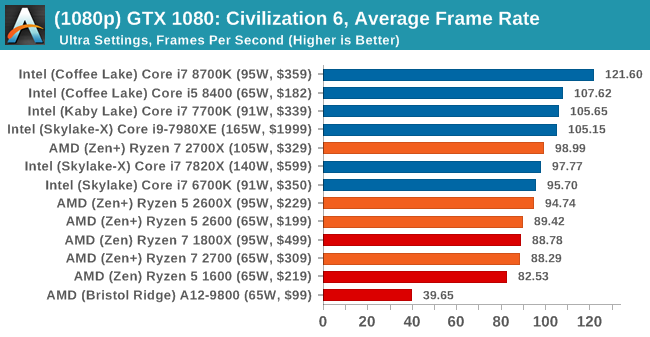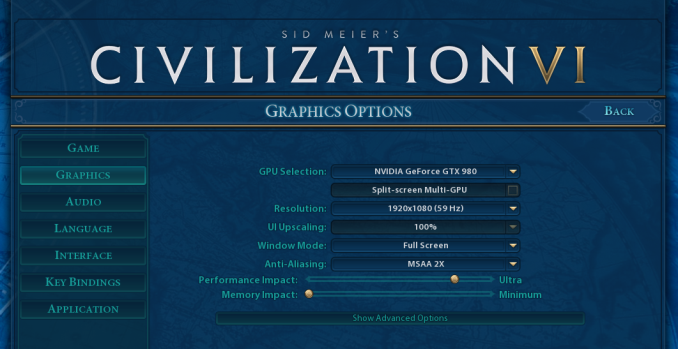The AMD 2nd Gen Ryzen Deep Dive: The 2700X, 2700, 2600X, and 2600 Tested
by Ian Cutress on April 19, 2018 9:00 AM ESTCivilization 6
First up in our CPU gaming tests is Civilization 6. Originally penned by Sid Meier and his team, the Civ series of turn-based strategy games are a cult classic, and many an excuse for an all-nighter trying to get Gandhi to declare war on you due to an integer overflow. Truth be told I never actually played the first version, but every edition from the second to the sixth, including the fourth as voiced by the late Leonard Nimoy, it a game that is easy to pick up, but hard to master.
Benchmarking Civilization has always been somewhat of an oxymoron – for a turn based strategy game, the frame rate is not necessarily the important thing here and even in the right mood, something as low as 5 frames per second can be enough. With Civilization 6 however, Firaxis went hardcore on visual fidelity, trying to pull you into the game. As a result, Civilization can taxing on graphics and CPUs as we crank up the details, especially in DirectX 12.
Perhaps a more poignant benchmark would be during the late game, when in the older versions of Civilization it could take 20 minutes to cycle around the AI players before the human regained control. The new version of Civilization has an integrated ‘AI Benchmark’, although it is not currently part of our benchmark portfolio yet, due to technical reasons which we are trying to solve. Instead, we run the graphics test, which provides an example of a mid-game setup at our settings.
At both 1920x1080 and 4K resolutions, we run the same settings. Civilization 6 has sliders for MSAA, Performance Impact and Memory Impact. The latter two refer to detail and texture size respectively, and are rated between 0 (lowest) to 5 (extreme). We run our Civ6 benchmark in position four for performance (ultra) and 0 on memory, with MSAA set to 2x.
For reviews where we include 8K and 16K benchmarks (Civ6 allows us to benchmark extreme resolutions on any monitor) on our GTX 1080, we run the 8K tests similar to the 4K tests, but the 16K tests are set to the lowest option for Performance.
All of our benchmark results can also be found in our benchmark engine, Bench.
MSI GTX 1080 Gaming 8G Performance
1080p



4K



8K



16K
















545 Comments
View All Comments
John_M - Monday, April 23, 2018 - link
What edition of Windows 10 to typical gamers use and why?johnsmith222 - Monday, April 23, 2018 - link
In the meantime we have a lot benches to analyse :)Sum of web benches:
https://www.3dcenter.org/news/ryzen-2000-launchrev...
oRAirwolf - Monday, April 23, 2018 - link
I would really like to see some storage bench mark to compare pre and post Spectre/Meltdown patching of Intel CPUs as well as an apples-to-apples comparison of nvme storage performance compared to an Intel 8700k.Silma - Monday, April 23, 2018 - link
It's really hard to generalize on why people purchase the processors they do.I met a guy online with an over the top, super expensive computer. His sole purpose seems to be the first in the online tests and he will spend hours fine tuning the overclocking and whatnot.
Another guy mostly playing D3 purchased a 3K euro computer, which is absolutely over the top for what he plays/does. His reasoning is, I change my computer every 10 years, so when i do, I want the best components.
In my opinion, for most people without special needs (YouTube encoding, 3D rendering and whatnot), most processors have been good enough for years, and there is no reason to invest a lot in a processor when money is much better spent in an x4 PCIe SSD where you'll instantly feel the difference vs a hard drive or a medium quality SSD.
To me, power consumption and noise of processor as well as graphic card is a consideration at least as important as price.
The sole reason I would change processor today would be to get a fully Thunderbolt 3 compatible system, since the first TB3 audio interfaces are slowly coming to market.
Then again, I'm sure many people will have other priorities and reasons for purchasing their processors.
Targon - Monday, April 23, 2018 - link
Many of these high end systems are overpriced, or they come with components that are not worth it for what is being done. With that being said, going for a higher end CPU does make sense for those looking to keep their systems for a long time. Video cards and storage are areas that people should pay close attention to when it comes to price.NVMe drives are VERY expensive if you go up to the 1TB level, so spending that sort of money doesn't make sense when the prices will drop in the next two years. A 250-500GB NVMe drive would make more sense when combined with a traditional hard drive for additional storage. Video cards are also at a premium right now, as is RAM. If the system were purchased back in April of 2017, then yea, not too horrible to go for 32GB of RAM back then, but now, I'd stick with 16GB of RAM due to the prices being so much higher than they were.
For desktops, Thunderbolt isn't all that amazing when you can add a video or sound card to the system that will do what you want it to. Laptops are another story, and you need to pick and choose your priorities.
Flying Aardvark - Monday, April 23, 2018 - link
That's if you're short on money. I don't spend much extra other than vacations & eating very well. So when I upgrade, which is every 5 to 10 years, I buy the best available like Silma. I have a 1TB 960 Pro for that reason, it was $650 and I didn't think twice about it. I need the most reliable, fastest drive at the time. The 960 Pro is a MLC memory configuration, I've always used higher end MLC drives and they've served me very well.I'm not waiting a year or two, when I have over $100,000 sitting in my bank account doing nothing. What's the point, it's just $650. Same goes for the rest of my computer, which I only own/maintain one of.
Not everyone is a child or someone who doesn't spend the majority of their time progressing their careers so they can make more money. The price consideration is not the end-all, ultimate rule on hardware for every single consumer.
mapesdhs - Monday, April 23, 2018 - link
Indeed, though I guarantee some here will react poorly at the notion of someone who can make such a purchasing decision. :) Sometimes the best makes perfect sense, and if one can afford it, then why not.Kaihekoa - Monday, April 23, 2018 - link
Why are Anand's gaming numbers showing the 2700X beating all Intel CPUs when every other reviewer still shows the 8700K/7700K still being the best gaming CPUs?Flying Aardvark - Monday, April 23, 2018 - link
TechRadar & the wccftech preview has the same results. If you have been following Spectre as I have, you would've seen even users find this result. See the top comments here. https://np.reddit.com/r/pcmasterrace/comments/7obo...AT, TR & WCCF's results are accurate. Many reasons for this.
- Many reviewers used the old Ryzen balanced power setting which cripples the 2700X
- Disallowed the motherboard settings that push the chip over TDP
- Fully patched as possible for Spectre v1 & v2, which cripples Intel up to 50% in IO heavy tasks (streaming textures for games that do so).
There is naturally, lots of resistance to the fact that AMD is dominating. It's over for now, time for people to just admit it, they got screwed if they don't have Ryzen. Or at least, bought the inferior product.
mapesdhs - Monday, April 23, 2018 - link
I don't think those posting so much venom about the results will change their minds until AMD releases something that really is just right out the gate blatantly faster, including for IPC. Another year or two and I think that will happen.